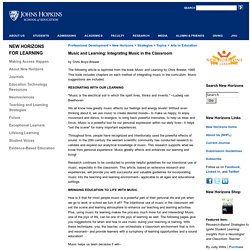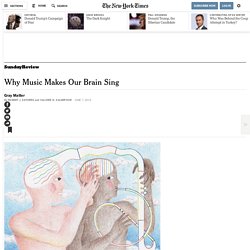

Mozart - Requiem in D minor (Complete/Full) The Mozart Effect How Music Makes You Smarter. Have you ever noticed how your favorite music can make you feel better?

Well, new research studies now show how music can make you smarter too! Scientists at Stanford University, in California, have recently revealed a molecular basis for the Mozart Effect, but not other music. Dr. Rauscher and her colleague H. Li, a geneticist, have discovered that rats, like humans, perform better on learning and memory tests after listening to a specific Mozart sonata. A book called The Mozart Effect by Don Campbell, has condensed the world's research on all the beneficial effects of certain types of music. Some of the hundreds of benefits of the Mozart Effect are: Improves test scoresCuts learning timeCalms hyperactive children and adultsReduces errorsImproves creativity and clarityHeals the body fasterIntegrates both sides of the brain for more efficient learningRaises IQ scores 9 points (research done at University of California, Irvine) Study Reveals How Music Makes You Smarter Mr.
Dr. . $18.00 Each CD. Johns Hopkins University School of Education Music and Learning: Integrating Music in the Classroom. By Chris Boyd Brewer The following article is reprinted from the book Music and Learning by Chris Brewer, 1995.

This book includes chapters on each method of integrating music in the curriculum. Music suggestions are included. "Music is the electrical soil in which the spirit lives, thinks and invents. " --Ludwig van Beethoven We all know how greatly music affects our feelings and energy levels! Throughout time, people have recognized and intentionally used the powerful effects of sound.
Research continues to be conducted to provide helpful guidelines for our intentional use of music, especially in the classroom. How is it that for most people music is a powerful part of their personal life and yet when we go to work or school we turn it off? Music helps us learn because it will-- Here are three areas of teaching where integrating music can be highly effective.
LEARNING INFORMATIONMusic can be used to help us remember learning experiences and information. In the 1960's, Dr. Pianoforte. Baroque Music Helps You Focus! Music is a more potent instrument than any other for education...Plato Are you a person who is easily distracted?

In the midst of a busy day at the office finding creative space to concentrate and forge ahead is a real challenge. Here's a suggestion... it's possible to set up a creative space by playing baroque background music as you work. Not your style? If you're willing to give it a trial, the results may surprise you. In a three year research study, Maya Ruvinshteyn and Leonard Parrino, instructors in math at Essex County College and Rutgers-Newark, found when they played baroque background music in their classes, it made a difference.
Whistlin' While You Work? Super Learning Music - Baroque Tune at 60 bpm - Improves Study, Creativity and Chill. This is your brain on music. Researchers want to better understand what happens in your brain when you listen to music. Music was shown to lower anxiety more than medications in one studyBrain activation patterns are related to how much people like particular songsConsistent activity patterns are seen when different people listen to the same musicResearchers may gain insights into neurological and psychiatric issues (CNN) -- Whether you are rocking out to Macklemore & Ryan Lewis in your car or reading with Bach in your bedroom, music has a special ability to pump us up or calm us down. Scientists are still trying to figure out what's going on in our brains when we listen to music and how it produces such potent effects on the psyche.
"We're using music to better understand brain function in general," said Daniel Levitin, a prominent psychologist who studies the neuroscience of music at McGill University in Montreal. Three studies published this month explore how the brain responds to music. Why Music Makes Our Brain Sing. Photo MUSIC is not tangible.

You can’t eat it, drink it or mate with it. It doesn’t protect against the rain, wind or cold. It doesn’t vanquish predators or mend broken bones. And yet humans have always prized music — or well beyond prized, loved it. In the modern age we spend great sums of money to attend concerts, download music files, play instruments and listen to our favorite artists whether we’re in a subway or salon.
So why does this thingless “thing” — at its core, a mere sequence of sounds — hold such potentially enormous intrinsic value? The quick and easy explanation is that music brings a unique pleasure to humans. More than a decade ago, our research team used brain imaging to show that music that people described as highly emotional engaged the reward system deep in their brains — activating subcortical nuclei known to be important in reward, motivation and emotion.
Why the auditory cortex? Continue reading the main story.